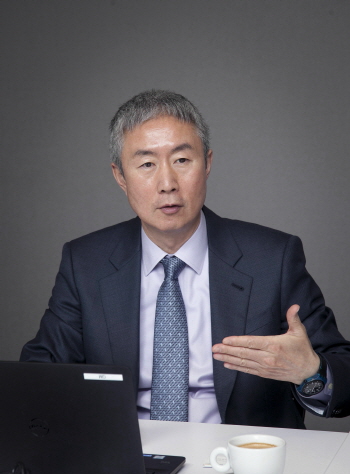[Interview] CEO Lee Seung-woo of Gilead Sciences Korea
When the news spread six years ago that Gilead Sciences길리어드 would enter the Korean market, all eyes of the domestic pharmaceutical industry were on who would become the first CEO of Gilead Sciences Korea길리어드 한국지사.
Gilead Sciences had developed big-hit drugs, such as chronic hepatitis B therapy Hepsera (sold by GSK Korea) and influenza treatment Tamiflu (marketed by Roche Korea), and added various new medicines, including another hepatitis B therapy Viread, all of which meant it would exert significant influence on the domestic market's dominion.
When Gilead Sciences named Lee Seung-woo 이승우, who had served as CEOs at Wyeth Korea한국와이어스 (now merged into Pfizer), MSD Korea 한국MSD, and Astrazeneca Korea 한국아스트라제네카, as the first chief executive officer of its local operation later, the industry’s attention on Gilead grew even bigger. There was nothing strange about it, either; Lee was a manager with the “Midas touch,” who had made all the companies he was in grow drastically.
Gilead Sciences Korea under CEO Lee has made Viread a mega blockbuster with 100 billion won ($88 million) in annual sales, taken the lead in hepatitis C therapy market with Sovaldi, and released various Human Immunodeficiency Virus (HIV) treatments, including Stribild. Based on these performances, it recorded the turnover of 260 billion won last year to be ranked at ninth place among multinational companies operating in Korea. Korea Biomedical Review met CEO Lee who is writing a growing success story in the domestic pharmaceutical industry.

Question: What were your achievements last year?
Answer: I think the biggest accomplishment last year was giving hopes of full recovery to hepatitis C patients, with two of our treatments, Sovaldi and Harvoni. Sales also increased 90 percent, according to IMS Health’s data. Gilead Sciences Korea has recorded sales growth of 37 percent on annual average over the past three years.
Q: You have received attention with a series of new drugs in Korea, including Viread and Sovaldi. What will be the new attention-getters this year?
A: We plan to release some HIV therapies, such as Genvoya and Descovy this year. These medicines have reduced side effects compared with the existing treatments, providing opportunities to receive safer treatments for patients who have to take drugs for a long time. A new hepatitis B therapy Vemlidy will also be on the market following Viread, the current market leader in prescription amount.
Q: Some people say Gilead Sciences is Apple of the pharmaceutical industry.
A: That may be because both companies have short histories, grew rapidly, and released many innovative products.
Q: What is Gilead’s iPhone, then?
A: Tenofovir could be it. Good selection and concentration were major factors behind the remarkable achievements Gilead Sciences have made. Also, we boldly entrust to our partners what we can’t do well. For example, we are good at developing new drugs but are poor at producing pharmaceutical chemicals. So we have sought good partners, and one of them is Yuhan Corp. Yuhan is the biggest provider of raw material medicines of hepatitis C for Gilead Sciences.
Q: The patent of Viread will expire soon, registering annual sales of 100 billion won. Can we regard Vemlidy as its successor?
A: My father died of hepatitis C. At that time, hepatitis C developed to cirrhosis and liver cancer, causing death. Now more than 90 percent of patients are fully recovered after 12 weeks of treatment. Pharmaceutical companies develop drugs to make such a change. Some ask why Gilead keeps developing new medicines while it has patents of HIV drugs yet to be expired. However, we have convictions that we must continue to develop new medicinal products for the sake of patients. The same can be said of hepatitis B drugs. We keep releasing new drugs to make patients receive better treatment.
Q: The pharmaceutical industry says you have the “Midas touch,” saying you have made all the companies you were in grow drastically.
A: That’s an exaggeration. I was just lucky. I guess I have been able to produce good results because I worked with excellent people in good companies.
Q: What could be the most important virtue leaders must have?
A: I think you can accomplish much with people who can go along with you sharing your dreams. What matters most is a “visionary” leadership, which allows employees to share your vision and struggle to make them true. Also necessary is value-centered leadership. Not all luxury brand clothes fit for me. So do employees. Some people with excellent qualification may not be suitable for our company. What’s more important (than qualifications) is whether they can share our values.
Q: Multinational pharmaceutical companies operating in Korea point out this country does not fully recognize the “value of innovation’. What do you think?
A: That is a complicated issue. The universal health insurance is one the advantages Korea has and an excellent medical system. However, the drug pricing scheme still has a long way to go. It’s pitiable that patients cannot get new drugs they need to have. The social perception that regards drug price only as costs also needs to change. Good new medicines are an investment into people and public welfare. Also, only when investments are made, will Korean new drugs be able to receive right prices and be used in global markets.

